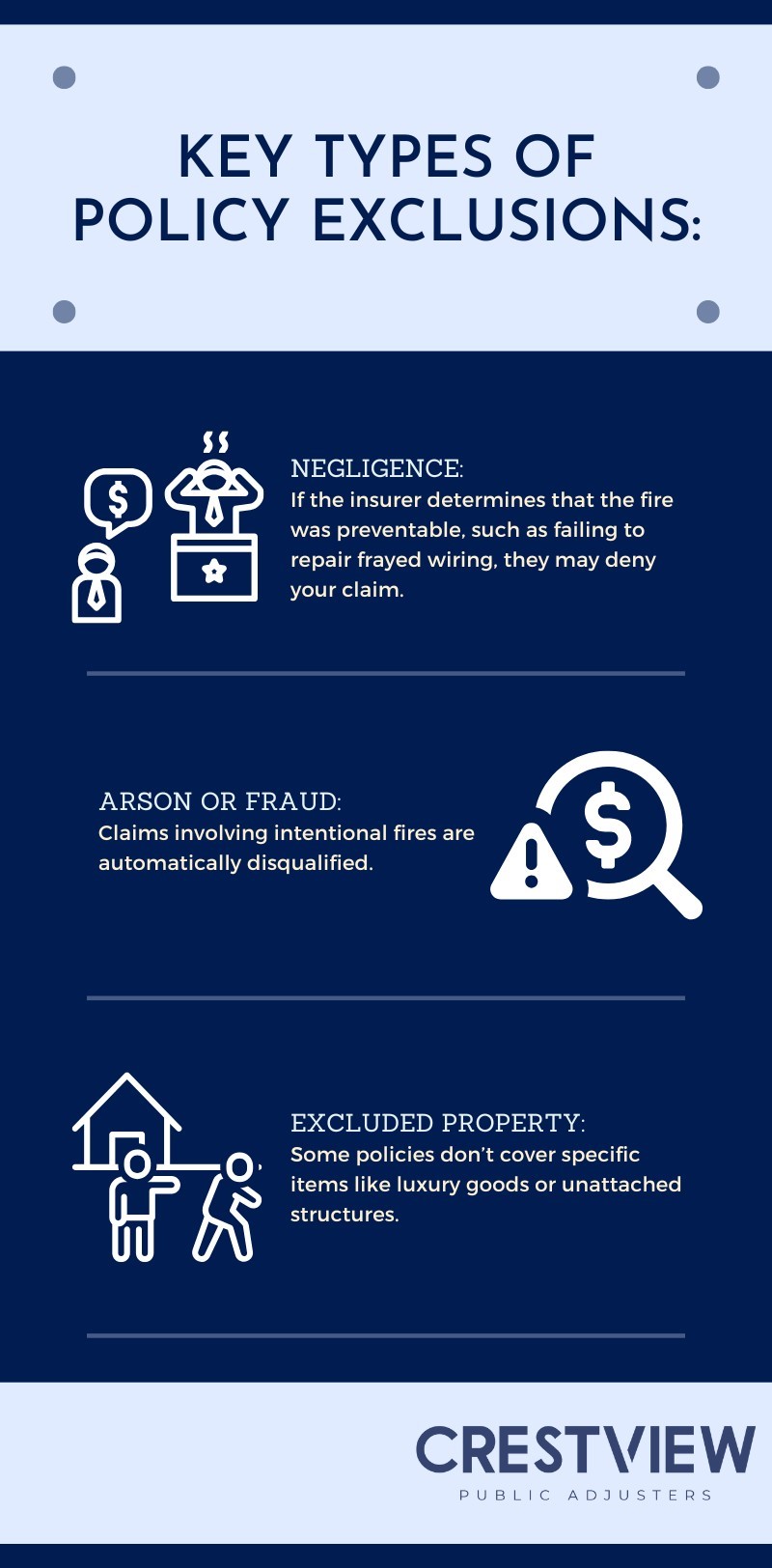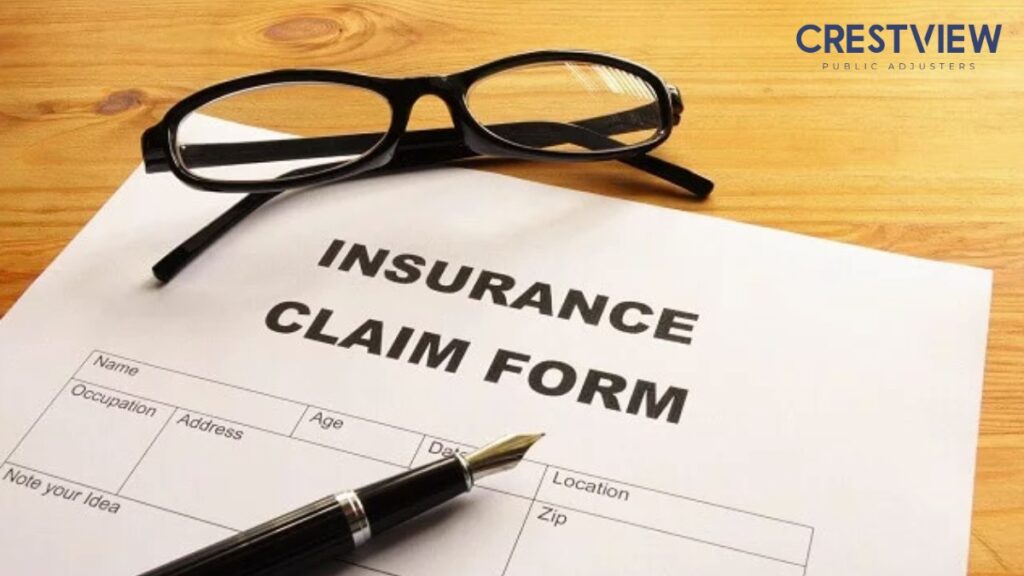Key Points:
- Fire insurance claims are often denied due to policy exclusions, insufficient documentation, or late filing.
- Misrepresentation or fraud can also lead to denials.
- Knowing your rights and seeking expert guidance can help ensure claim success.
Fire damage is a leading cause of property losses in the United States. While homeowners invest in insurance to cover such catastrophic events, many are shocked when their fire claims are denied. In fact, up to two-thirds of home insurance claims are denied annually, often for preventable reasons. Knowing the most common reasons insurance companies deny fire claims can help you avoid these pitfalls and improve your chances of receiving fair compensation.
Reasons Insurance Companies Deny Fire Claims
Insurance companies deny fire claims for various reasons, from strict policy exclusions to procedural errors. Understanding these reasons is essential for policyholders to strengthen their claims and avoid preventable issues.
1. Policy Exclusions: What’s Not Covered Can Hurt You
One of the primary reasons for fire claim denials is the presence of exclusions in the policy. Insurance policies are filled with clauses that detail what is—and isn’t—covered. These exclusions often include specific scenarios or damages that insurers won’t compensate for.
For example, if the fire resulted from illegal activity, arson, or neglect, the insurer might deny your claim outright. Certain policies also exclude coverage for damage caused by faulty electrical wiring or outdated systems if the homeowner fails to maintain them properly.

How to Protect Yourself:
- Review your policy for exclusions and clarify ambiguous terms with your insurance agent.
- Ensure your property is regularly maintained and up to code.
- Document all safety measures, such as installing smoke detectors and fire alarms.
2. Insufficient Documentation: The Proof You Provide Matters
Lack of documentation is another leading reason for claim denials. Insurance companies require clear evidence to validate your claim, including proof of the fire’s cause, the extent of the damage, and the value of destroyed items. Without this, they may argue that your claim is unverifiable.
Policyholders often overlook the importance of creating a detailed inventory of their possessions or fail to keep receipts for high-value items. This becomes a problem when trying to prove losses after a fire.
What You’ll Need for a Successful Claim:
- Photos or videos showing the extent of the fire damage.
- Receipts or proof of purchase for high-value belongings.
- A written inventory of damaged or destroyed items.
Tips to Avoid Denial:
- Start documenting immediately after the fire. Take photos of every affected area.
- Secure fire department reports as additional evidence.
- Keep records of home renovations or upgrades that may increase the property’s value.
3. Late Filing: Missing Deadlines Can Cost You
Insurance policies come with strict timelines for filing claims. If you miss these deadlines, insurers may deny your claim, citing failure to comply with the policy’s terms. The clock starts ticking as soon as the fire occurs, and delays can complicate the process.
Late filing often happens because policyholders are overwhelmed by the disaster and unsure of what steps to take. Unfortunately, this leaves insurers with an easy excuse to deny your claim.
How to Avoid Timing Issues:
- Notify Your Insurer Immediately: Inform them as soon as you’re safe and the fire is under control.
- Understand Deadlines: Check your policy to know how long you have to file your claim.
- Stay Organized: Keep a checklist of documents and deadlines to avoid missing any steps.

4. Misrepresentation or Fraud: Transparency Is Critical
Insurance companies are quick to deny claims if they detect inconsistencies or intentional falsehoods. Even small errors, like misstating the square footage of your home or failing to disclose tenants in the property, can lead to claim denials.
Fraudulent activity, such as inflating the value of lost items or misreporting the fire’s cause, is another red flag for insurers. They often investigate claims thoroughly, especially when large sums of money are at stake.
Preventing Misrepresentation Issues:
- Be honest and precise when applying for insurance or submitting a claim.
- Double-check your claim forms for accuracy.
- Consult with a public adjuster to ensure your claim is complete and truthful.
5. The Insurer’s Damage Assessment Differs From Yours
Disagreements about the extent of the damage are common in fire claims. Insurers often send their own adjusters to evaluate the property, and their findings may not align with yours. They might argue that some damage was pre-existing or unrelated to the fire, reducing the payout—or denying it entirely.
How to Navigate Disputes:
- Hire an independent appraiser to assess the damage.
- Keep maintenance and inspection records to counter claims of pre-existing issues.
- Appeal the decision if you believe the insurer’s assessment is inaccurate.
6. Non-Compliance With Policy Conditions
Most insurance policies include specific conditions that policyholders must meet to maintain coverage. These conditions might include installing smoke alarms, maintaining fire extinguishers, or keeping the property in good condition. Failing to meet these requirements can be grounds for claim denial.
Examples of Non-Compliance Issues:
- Not installing mandatory safety equipment like smoke detectors.
- Failing to maintain the property in a habitable condition.
- Not informing the insurer about significant property changes, like renovations.
Stay Compliant by:
- Conducting regular safety inspections.
- Updating your insurer about changes to the property.
- Keeping receipts and records for installed safety devices.
Let Crestview Public Adjusters Help You Reclaim What’s Yours
Dealing with fire damage is stressful enough without the added frustration of a denied claim. If you’re facing challenges with your fire insurance claim in New York, New Jersey, or Florida, Crestview Public Adjusters is here to help.
Our team specializes in navigating complex claims, ensuring you receive the compensation you deserve. We’ll review your policy, document your losses, and negotiate directly with your insurance company so you don’t have to.
Contact Crestview Public Adjusters today for a free consultation and let us fight for the settlement you deserve!

